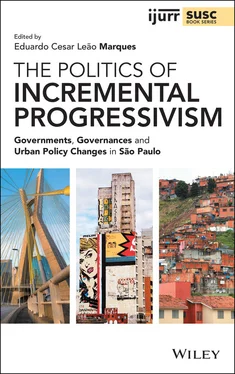Comparative politics debates on Southern cities in the 1990s and 2000s failed to solve the problem either, since they were polarized between pessimistic accounts of clientelism, patronage and government failures, and optimistic interpretations of decentralization and participation, especially in Latin America. 4 By different routes, both views have tried to make sense of the unsolved problems of the quality (Diamond and Morlino 2004) of the “third wave” of democracies (Huntington 1991). However, although the analyzed processes are real, the broader consequence of these emphases is a theoretical dichotomization, as if the processes behind the politics and policies of Southern cities (not to mention their heterogeneity) were intrinsically different from those found elsewhere. This involves at least two opposite interpretations of local political mobilizations.
On the one hand, this literature has frequently treated clientelism imprecisely, including any kind of contact between politicians and citizens, individually or in groups, and concerning any State policy, service or public good. In its better versions, an effort has been made to separate: (i) policy representativeness (when the representative follows her constituency position), (ii) service representativeness (when she ensures benefits to it), (iii) allocation responsiveness (when she provides particularized benefits), and (iv) symbolic responsiveness, or public gestures that create trust and support (Elau and Karps 1977). Kitschelt and Wilkinson (2007) and Stokes et al. (2013) added further conceptual clarity to the field, differentiating pork barrel – when public or club goods are delivered to a constituency without individualization or monitoring – from clientelism – when individualized, or club goods are delivered in politically contingent exchanges with the monitoring of voters by brokers. Weitz‐Shapiro (2014) added another dimension by exploring variations at the local level in the same country (Argentina) and arguing that it is the combination of intense political competition with large middle classes (reduced poverty) in some places that leads politicians to drop clientelist relations, rather than each element in isolation, as usually considered by the literature.
Despite the significant contributions of this literature, though, by directly associating ground‐level political mobilization with distributive electoral politics, it became blind to processes between elections, as well as inside governments. Additionally, the usual normative point of departure of clientelism makes it challenging to distinguish from constituency services, also widely present in Europe and the United States (Dropp and Peskowitz 2012), with very few exceptions (Bussell 2019), as well as to incorporate the role of organizations (Holland and Palmer‐Rubin 2015). Above all, definitions of clientelism tainted by normativity have a particular difficulty in understanding the subtle and dubious strategies found within the relations and political networks that connect political parties with daily urban life in places like Latin America and India (Auyero 2000; Rivadulla 2012; Auerbach 2016; Bussell 2019). We shall return to these processes in Chapter 2while discussing the role of councilors in territorial political mobilization.
Interestingly enough, other widely disseminated views sustain that these same cities are arenas of decentralization, participation, and activism (Lopez 1996; Chaves and Goldfrank 2004; Holston 2009; Goldfrank 2011; Carrión and Ponce 2015), as well as innovative producers of institutionalized social participation (Cleary 2007; Baiocchi et al. 2011; Carmona 2012). As we shall see later, at least in Brazil's case, decentralization and the construction of participatory institutions have indeed been among the main features of policy reform since redemocratization (Arretche 2012), although mainly in social policies (education, health, social assistance) and much more rarely in urban policies due to the presence of federal incentives for the former (Gurza Lavalle 2018).
Brazil indeed experienced significant reforms in urban policies after redemocratization. These were produced from the bottom up, starting with local government innovations entangled with actors from the urban reform movement (Marques 2019) at the municipal level in the 1990s, and became national with the creation of the City Statute in 2001 and the Ministry of Cities in 2003 (Rolnik 2009; Klintowitz 2015). Reforms included new policy solutions with enlarged social participation, although more rarely than in social policies. The wide dissemination of analyses on Participatory Budgeting experiences led the international literature to consider these as a predominant and encompassing format of urban policy deliberation in Brazilian cities. However, while policy solutions spread in the country, these participatory arenas were rarer and less effective in budget allocation and policy formulation than considered by the first glance of the literature.
Only recently a new generation of studies in political science has been “bringing the city back in” to urban political institutions (Post 2019), departing both from a comparative ontology and from empirically grounded perspectives remote from normative premises. These include studies on the historical convergence of reform and political machine strategies in the United States (Trounstine 2009b), the diversification of machine politics in competitive environments in Bogotá, Naples and Chicago (Pasotti 2010b), differences in sanitation policy reforms in light of bureaucratic insulation and participation in Mexico (Herrera 2017) or the different local embeddedness of private providers in Argentina (Post 2014), the redistributive activism of judicial agents in São Paulo policies (Coslowsky 2016), the regressive effects of the judiciary in evictions in India (Bhan 2012), the role of local networks in the access to housing policies in Africa (Paller 2015) or in rooting party mobilization and policy production in India (Auerbach 2016, 2017). Even closer to the approach taken by this book, recent studies have focused on the governance of several policies in Mexico City (Ugalde and Le Galès 2017), Paris (Le Galès 2020) and Milan (Andreotti 2019).
Therefore, a fortunate contemporary convergence is identifiable, potentially enhancing our understanding of how city politics and policies work worldwide. While urban studies were expanding their comparativism (Robinson 2011), comparative political science has been rediscovering subnational politics (Giraudy et al. 2019). This book intends to contribute to this ongoing debate while constructing bridges between these fields at the same time as emphasizing the specificity of city politics and policies within subnational politics.
City Studies, International Comparisons, and Urban Theories
This book is a city monograph with nested comparisons between policy sectors mainly within this city. However, it departs from a comparative ontology and forms part of a broader international comparison between Paris, London, Mexico City, Milan, and São Paulo. 5 The production of city comparisons has moved to the forefront of contemporary international debates (Robinson 2011), attaining general acceptance among urban scholars. Essential agreements were also reached about the importance of avoiding the imposition of theoretical models produced solely from cases in the Global North (Scott 2012). The consequences of comparisons for theory production, however, remain contested, leading to polarized debates between generalizations in urban theory (Scott and Storper 2015) and about postcolonial ontologies (Roy 2016).
In an unusual convergence, political science has also been revitalizing its approach to comparisons. Nation‐state comparisons are a classic subject of studies in comparative politics (Evans et al. 1985; Levitsky and Roberts 2011) and methods (Tilly 1992; Ragin 1987). The field has also compared cities for a long time (Ruchelman 1969; Ferman 1985), as well as subnational variations more recently (Weitz‐Shapiro 2014). Lately, however, comparisons between multi‐scales in different countries (Pasotti 2010b; Holland 2018a) have also been incorporated in what Giraudy et al. (2019) call subnational research (SNR) and Sellers (2019) transnational comparisons. In this case, variations in national features may be simultaneously analyzed with local processes and with the connections between national and subnational politics (Sellers and Kwak 2010), renovating our models about political processes and avoiding theory stretching (Giraudy et al. 2019).
Читать дальше












